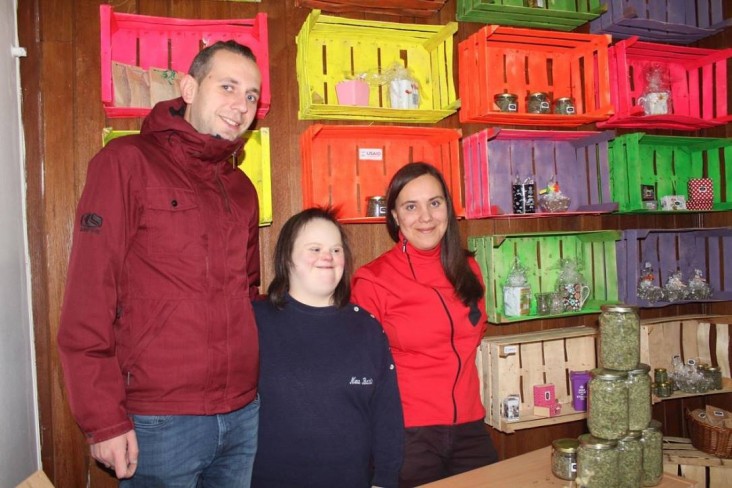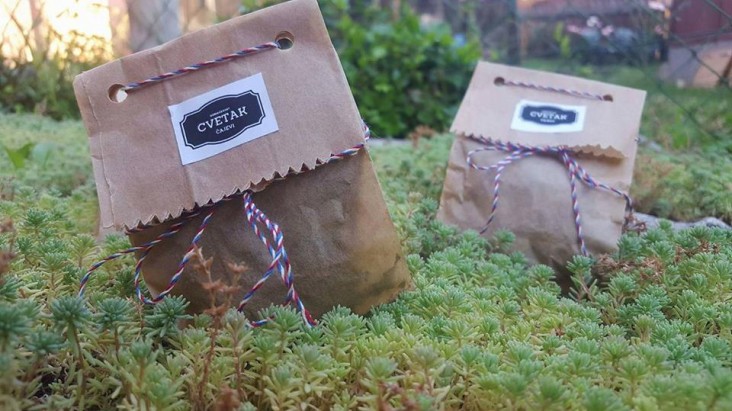Speeches Shim

“If I want something to change, I first change myself so I can inspire others to do the same.” That is the motto of 34-year-old Irma Zerdo of Visoko, a woman with a passion for music and the outdoors.
Zerdo is a musician by trade, with a music school degree, but she could not find a paying job in her line of work. She is not alone: Joblessness in Bosnia and Herzegovina (BiH) for people in her age group is over 40 percent. So Zerdo knew she had to create her own destiny. She stayed true to what she loved and started a business based on nature.
She attended various trainings on growing and using medicinal herbs. Then she and her best friend, Edin Islamović, set to work on 1 dunam (.25 acres) of land, growing organic mint, lemon balm, calendula, artemisia and aronia. What they could not grow, they collected from the mountains across the country.
Zerdo mixed and matched the herbs and spices to make her own special teas, and sold them through social media. The teas were popular and the business was fun, but the sales did not produce enough income for her to live on. She wanted to take her little business to the next level, to become a serious entrepreneur.
She applied for and won a grant from USAID’s fund to support businesses owned by marginalized women. She used the grant — with co-assistance from Visoko municipality — to rent shop space and buy the equipment she needed to go commercial.
Today Zerdo has a tea boutique called “Cvetak” (Little Flowers), located at the heart of Visoko, where she offers passers-by and tourists a little bit of BiH health and nature to take back home. Behind the counter, dozens of tea varieties are on display in their own unique packaging. As explained to customers when they enter the store, each variety is each infused with a legend, like the one about the mystical power of mistletoe.

But the magic does not start and end there. Cvetak is more than a story about one young woman’s success. It’s a story about unity and social inclusion, too.
Zerdo provides opportunities for persons with developmental disabilities as well as other women in the Visoko area and other parts of BiH. She hires them to make the packaging, prepare the teas, and help with buying herbs. Her sister Berina, a young woman with Down syndrome, is one of them.
“Berina looks like a little girl, but she is an adult and needs to be treated as such. Her three hours of work mean a lot to us and to her,” Zerdo said. “There aren’t many ways to include people with Down syndrome in the life of their community, but I really want to give them that opportunity.”
Berina doesn’t talk much, but she works hard — in the field gathering herbs, sorting teas, or at the Cvetak counter.
Zerdo plans to expand the business, and says she is brimming with new ideas. If everything goes according to plan, Zerdo plans to hire Berina’s friend, who also has developmental disabilities. He is a talented painter and will hand paint more unique packaging for Cvetak teas.
The people of Visoko will certainly not be lacking good tea nor the good karma of Zerdo anytime soon.
Zerdo is one of more than 200 women in BiH who have received support from USAID’s Marginalized Populations Support Program and their local municipalities to launch and grow their own businesses, providing them with livelihoods and independence, and restoring their faith in a better future. The program is designed to help groups underrepresented in BiH society, such as women, youth, people with disabilities, Roma and the LGBTI community.
LINKS

Comment
Make a general inquiry or suggest an improvement.